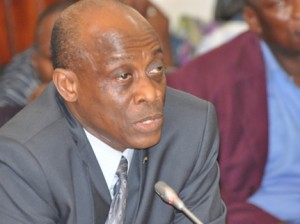ECOWAS states on course to implement common external tariff – Terkper

Ghana and other member states of the Economic Community of West African States are on course to implement the ECOWAS common external tariff (CET) next year, Mr. Seth Terkper, the Minister of Finance said on Thursday.
The CET is the single tariff rate agreed to by all members of a customs union on imports of a product from outside the union.
The CET for ECOWAS was adopted at a Heads of State Summit in October 2013 in Dakar.
Speaking at the final meeting of Ministers of Finance and Director Generals of Customs of member States, Mr Seth Terkper said: “We are at the final phase of the road map agreed upon by all member states.”
The Minister, however, noted that Ghana might not meet the January 2015 target of member states since some sections of the tariff are still in the process of gaining parliamentary approval.
He said that government has engaged consultants for impact assessment of the common external tariff, on the Ghanaian economy.
A CET committee comprising key personnel from some ministries such as the Ministry of Finance, Communications and the Ministry of Foreign Affairs have also been examining the tariff and its implications.
Mr Terkper reiterated the importance of the CET as a huge stride in economic integration efforts and as an instrument to protect strategic sectors within the regional economy.
In view of this, government has been engaging in sensitization of stakeholders to be directly affected by the tariff, such as freight forwarders.
He added that there are several lessons which we can learn from our integration efforts. “We have come up with other reforms in the march to CET.” He said.
The Ambassador of Germany to Ghana, Mr. John Ruediger said the CET would represent a huge step to steeper integration among member states of ECOWAS and that similar measures were once huge building blocks of the European Union (EU) as it is today.
He further added that this advance in regional integration will provide better economic governance and a stronger base for international trade negotiations, while accelerating the march to the ECOWAS vision 2020.
Source: GNA
